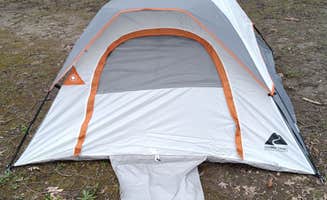Tent campsites near Genoa, Illinois range from primitive sites that require water transport to options with more amenities within short driving distance. The region sits at approximately 830 feet above sea level in DeKalb County, with the Kishwaukee River serving as a central natural feature for many camping areas. Summer temperatures typically reach the mid-80s during peak camping season from May through September, with occasional thunderstorms requiring proper tent setup and drainage considerations.
What to do
Kayaking the Rock River: At Castle Rock State Park Campground, paddlers can access boat-in campsites that offer a unique experience. "I took out an inflatable kayak to test it out, and loooved the rock formations on the river. Definitely a special sight because I usually stay closer to Chicago, where I haven't found such impressive geology," shared one visitor who noted the challenging upstream return paddle.
River fishing: Bring fishing gear to try your luck at multiple waterways. "We spent about 40 minutes getting to the campground while also enjoying the unique rock and sandstone formations along the way," mentioned a Castle Rock camper who observed "kingfishers, herons, and flycatchers" along the water.
Stargazing: Clear night skies make for excellent stargazing opportunities at several campgrounds. A camper at MacQueen Forest Preserve noted that "about half of the campsites are in a meadow at the back end of the campground. It would be beautiful for stargazing!"
Hiking forest preserves: Explore hiking trails throughout the region's natural areas. "There are over 640 acres of meadow, forest, and stocked pond," wrote a visitor to Lutheran Outdoor Ministries Center, adding that "there used to be a challenging obstacle course up a steep hill, over a wood wall with stations in the woods."
What campers like
Remarkable privacy: Campers consistently praise the separation between sites. One MacQueen visitor noted, "There are eight primitive campsites here, and they're spread out at least 50 yards apart. That's right, at least 50 yards. You can't see the campsite next to you."
Affordable pricing: The primitive campsites in the area are notably budget-friendly. A MacQueen Forest Preserve camper appreciated that "the primitive camping is only $4," while a Castle Rock visitor mentioned, "Sites are $6 per nite and each site allows up to 4 adults."
Wildlife encounters: The natural setting creates opportunities to observe local wildlife. At Franklin Creek State Natural Area Equestrian Campground, a visitor noted the area's abundant wildlife: "natural fauna that you would expect in these parts like gray and fox squirrels, white-tailed deer, racoons, chipmunks, beavers and opossums."
Well-maintained facilities: Despite being primitive, many campgrounds keep their basic facilities in good condition. "The bathrooms were well kept," wrote a visitor to MacQueen Forest Preserve, while another camper mentioned the "vault toilets and the one I used wasn't terrible, but it is primitive. There's even a light switch inside with a functioning light!"
What you should know
Train noise: Some campgrounds experience nearby train traffic. A MacQueen Forest Preserve camper advised: "if you cannot sleep to the sound of trains at night, this is not the campground for you. I don't mind them at all, and rather enjoy the sound, but there were probably three of them that went by in the middle of the night rather close to the campground."
Water access challenges: At some primitive sites, potable water isn't available. A MacQueen Forest Preserve camper emphasized: "There is water, but it is not, I repeat is not, potable."
Self-registration systems: Most primitive campgrounds operate on self-registration. At Castle Rock, "Sites can not be reserved and are first-come, first-served. Sites are $6 per nite and each site allows up to 4 adults... A small park-information stand contains the 'permits' that you can purchase on-site and money is collected via the honor system."
Paddling difficulty: At Castle Rock's canoe-in sites, visitors should prepare for the return journey. "Paddling back up river was not easy, but it was not impossible. It took approximately 3 hours, allowing for a few breaks to rest. It's definitely a small price to pay for a secluded campsite."
Tips for camping with families
Gear transport strategies: Some sites require walking in from parking areas. At MacQueen Forest Preserve, "You do have to walk into all of them, but they do have one wagon and a dolly you can use to tote things in. It's an easy walk, on a crushed gravel path and mowed trail."
Handicap accessible options: Families with mobility concerns have limited but available options. "There is one wheelchair accessible tent site on a blacktop path in the forest canopy," noted a camper at MacQueen Forest Preserve.
Swimming alternatives: While swimming options are limited at most primitive sites, Snug Harbor Inn Campground on Turtle Lake offers lake access within driving distance. A visitor described it as having "beautiful views overlooking Turtle Lake" with a "three tiered camping spot" setup.
Historic attractions: Combine camping with educational activities. At Franklin Creek, a camper highlighted that "this place has a really nice connection with history as it features a fully functioning grist mill that goes all the way back to early Americana where corn meal and wheat flour were made from the stream currents."
Tips from RVers
Limited RV options: True primitive camping near Genoa generally doesn't accommodate larger RVs, but some nearby options exist. Snug Harbor Inn Campground offers "full hookup, and great views. Has a pub/restaurant with good food," according to one visitor.
Seasonal considerations: The camping season in this region typically runs May through October. One camper noted that spring visits might mean fewer crowds: "I stayed one night and I really enjoyed myself. There wasn't anyone there. I assume it's because it's early in the spring."
Site selection for RVs: When RV camping is available, consider the terrain. At Snug Harbor, a visitor observed that "the property is basically terraced along a slope down to the lake, with the RV and mobile home sites closer to the lake."



